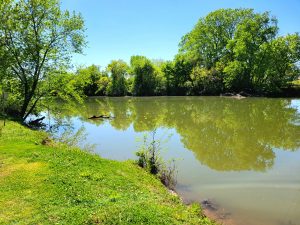BY MARK MCGEE
mcgee@bedfordcountypost.com
 The crown jewel of Tennessee Rivers could soon be losing some of its luster.
The crown jewel of Tennessee Rivers could soon be losing some of its luster.
That is the concern of the American Rivers group which has named the Duck River as the third most threatened river in the United States in its last report.
“Right now, we’re on a collision course,” Grace Stranch, CEO of the Harpeth Conservancy said. “This river is our lifeblood, but poorly planned growth will suck the river dry. The good news is, we can change course and wisely manage our water to protect the river, our economy, and quality of life.”
According to the report, the Duck River, which flows 270 miles through seven counties in Middle Tennessee, “is one of the top three most biodiverse rivers in the world, home to 22 aquatic snail species, 56 mussel species and 151 fish species.
“Many species in the Duck are federally listed as endangered or threatened, including a few whose only remaining viable populations are found in the river.”
Cities along the river are experiencing unprecedented growth that shows no signs of slowing down. The Tennessee Department of Conservation and Environment (TDCE) has been studying proposals and held a public hearing in October 2023.
“The Duck is an incredible river and resource for people and nature,” Anabel Winitsky, Association Director of Southwest Conservation for American Rivers said. “It’s the most biodiverse river in North America while also supporting communities and economies throughout Middle Tennessee. The Duck has joined the list of America’s Most Endangered Rivers because overdevelopment has brought it to a tipping point and we’re calling on leadership in Tennessee to act now to protect it.
A critical time
“Water supply for local communities and all life in the Duck River is in critical danger from overdevelopment, and the threat won’t end until Tennessee proactively works to understand, plan for, and protect long-term, sustainable use of the river.”
The proposals presented were:
* Lewisburg Water & Wastewater proposes the continued withdrawal of up to 4.57 million gallons per day from the Duck River in Marshall County for public water supply.
* Shelbyville Power, Water, and Sewerage Systems proposes the continued withdrawal of up to 8.35 million gallons of water per day from the Duck River in Shelbyville for public water supply.
* The Duck River Utility Commission proposes the continued withdrawal of up to 12.32 million gallons per day from Normandy Reservoir for public water supply.
* The City of Springhill proposes the continued withdrawal of up to 6 million gallons per day from the Duck River in Marshall County for public water supply.
* Bedford County Utility District proposes the continued withdrawal of up to 4.07 million gallons of water per day from the Duck River in Bedford County for public water supply.
* Maury County Water Systems proposes construction of a raw water intake in the Duck River near Columbia and withdrawal of up to 3 million gallons of water per day from the Duck River for public water supply.
Growth challenges
“Tennessee is one of the fastest growing states in the nation, and explosive growth in Middle Tennessee is having a major impact on local waterways, including and especially the Duck River, Amy Kober, Vice President of Communications for American Rivers wrote. “Population and industry growth has led to extreme development pressures, and local water utilities are trying to dramatically increase the amount of water they withdraw from the Duck.
“Unsustainable overconsumption of water from the Duck threatens to drain the river during periods of low flow and drought. This puts long-term water supply for local communities and the river’s aquatic inhabitants at risk.”
Stranch agrees with this assessment.
“The growth and population boom throughout Middle Tennessee puts enormous pressure on our water and sewer infrastructure as well as agricultural, industrial, and recreational uses of water pulled from our rivers,” Stranch said. “If this growth is not managed correctly, we will sacrifice both our natural heritage and the long-term health of our drinking water resources.
“We must take steps now to ensure that responsible permit conditions and proactive zoning planning are in place to balance growth with the ongoing protection of our water resources – including the Duck River. This requires prioritizing scientific and other studies necessary for thoughtful growth planning now.”
Need help from Governor
Many organizations are urging Tennessee Governor Bill Lee to adopt a three-prong attack to save the Duck River:
*Convening of a technical working group to provide expertise and recommendations regarding water management and conservation in the Duck River watershed.
*Direct TDEC to develop a comprehensive plan to proactively manage the long-term and sustainable use of the Duck River to ensure the river remains a resource for fish and aquatic life, public drinking water supply, recreation, and local industry.
* Fund much-needed scientific studies to understand the flow needs of the river to prevent the Duck River water levels from being too low due to short-sighted management decisions and unsustainable water withdrawals.
The lack of direction is of a major concern for Winitsky and others involved in their attempts to protect the Duck River.
“The fact is that Tennessee doesn’t yet have sufficient information to adequately plan for, and protect, the long-term sustainable use of the river,” Winitsky said. “It’s going to take commitment and action to get there.
“We need to get stakeholders to the table, to develop a comprehensive watershed plan, and to fund critical scientific studies to understand the flow needs of the river and ensure its health.”



![For-Tips-and-Ideas-Phone-300x250-Bedford-County-Post[1]](https://www.bedfordcountypost.com/wp-content/uploads/2023/09/For-Tips-and-Ideas-Phone-300x250-Bedford-County-Post1-300x250.jpg)
![Subscribe-Now-300x250-Bedford-County-Post[1]](https://www.bedfordcountypost.com/wp-content/uploads/2023/09/Subscribe-Now-300x250-Bedford-County-Post1-300x250.jpg)

